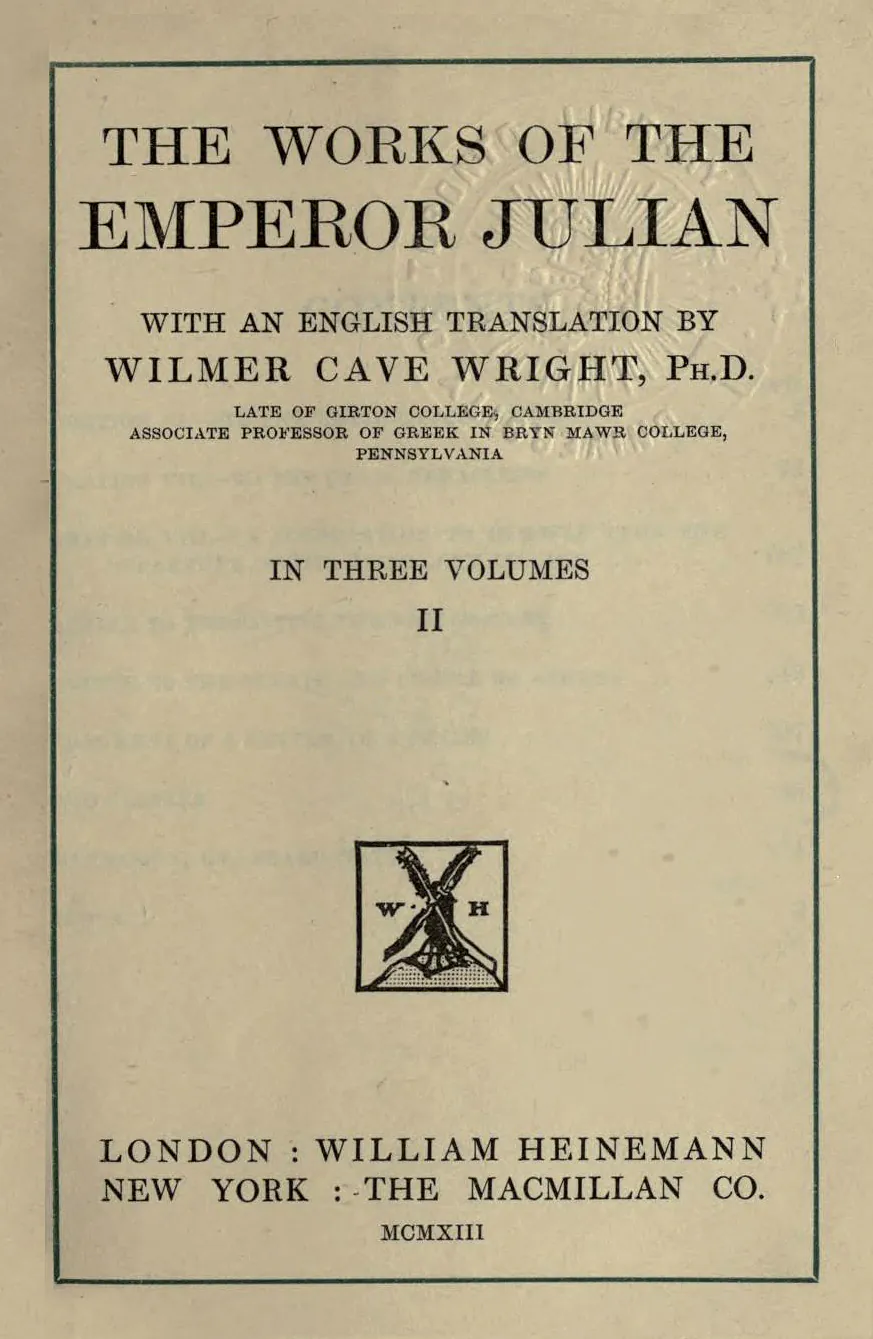[A]
δίδωμι γὰρ αὐτὸς τὴν αἰτίαν ὥσπερ οἱ τράγοι τὸ γένειον ἔχων, ἐξὸν οἶμαι λεῖον αὐτὸ ποιεῖν καὶ ψιλόν, ὁποῖον οἱ καλοὶ τῶν παίδων ἔχουσιν ἅπασαί τε αἱ γυναῖκες, αἷς φύσει πρόσεστι τὸ ἐράσμιον. ὑμεῖς δὲ καὶ ἐν τῷ γήρᾳ ζηλοῦντες τοὺς ὑμῶν αὐτῶν υἱέας καὶ τὰς θυγατέρας ὑπὸ ἁβρότητος βίου καὶ ἴσως ἁπαλότητος τρόπου λεῖον ἐπιμελῶς ἐργάζεσθε, τὸν ἄνδρα ὑποφαίνοντες
[B]
αὶ παραδεικνύντες διὰ τοῦ μετώπου καὶ οὐχ ὥσπερ ἡμεῖς ἐκ τῶν γνάθων. Ἐμοὶ δὲ οὐκ ἀπέχρησε μόνον ἡ βαθύτης τοῦ γενείου, ἀλλὰ καὶ τῇ κεφαλῇ πρόσεστιν αὐχμός, καὶ ὀλιγάκις κείρομαι καὶ ὀνυχίζομαι, καὶ τοὺς δακτύλους ὑπὸ τοῦ καλάμου τὰ πολλὰ ἔχω μέλανας. εἰ δὲ βούλεσθέ τι καὶ τῶν ἀπορρήτων μαθεῖν, ἔστι μοι τὸ στῆθος δασὺ καὶ λάσιον ὥσπερ τῶν λεόντων, οἵπερ βασιλεύουσι τῶν θηρίων, οὐδὲ ἐποίησα λεῖον αὐτὸ πώποτε διὰ δυσκολίαν καὶ μικροπρέπειαν,
[C]
οὐδὲ ἄλλο τι μέρος τοῦ σώματος εἰργασάμην λεῖον οὐδὲ μαλακόν. εἶπον γ ̓ ἂν ὑμῖν, εἴ τις ἦν μοι καὶ ἀκροχορδὼν ὥσπερ τῷ Κικέρωνι·1 Κικέρωνι Naber, cf. Plutarch, Cicero, Κίμωνι Hertlein, MSS. νυνὶ δ ̓ οὐκ ἔστι. καὶ εἰ2εἰ Reiske, ἃ Hertlein, MSS. συγγινώσκετε, φράσω ὑμῖν καὶ3ὑμῖν καὶ Reiske, μὲν Hertlein, MSS. ἕτερον. ἐμοὶ γὰρ οὐκ ἀπόχρῃ τὸ σῶμα εἶναι τοιοῦτο, πρὸς δὲ καὶ δίαιτα παγχάλεπος ἐπιτηδεύεται. εἴργω τῶν θεάτρων ἐμαυτὸν ὑπ ̓ ἀβελτηρίας, οὐδ ̓ εἴσω τῆς αὐλῆς παραδέχομαι τὴν θυμέλην ἔξω τῆς νουμηνίας τοῦ ἔτους ὑπ ̓ ἀναισθησίας,
[D]
ὥσπερ τινὰ φόρον ἢ δασμὸν εἰσφέρων καὶ ἀποδιδοὺς ἄγροικος ὀλίγα ἔχων οὐκ ἐπιεικεῖ δεσπότῃ. καὶ τότε δὲ εἰσελθὼν τοῖς ἀφοσιουμένοις ἔοικα. κέκτημαι δὲ οὐδένα, καὶ ταῦτα βασιλεὺς ἀκούων μέγας, ὃς καθάπερ ὕπαρχος ἢ στρατηγὸς διὰ πάσης τῆς οἰκουμένης ἄρξει τῶν μίμων καὶ τῶν ἡνιόχων· ὅπερ ὑμεῖς ὁρῶντες ὀλίγῳ πρότερον ἀναμιμνήσκεσθε νῦν ἥβης ἐκείνης νοῦ τ ̓ ἐκείνου καὶ φρενῶν.4ἀναμιμνήσκεσθε—φρενῶν Hertlein writes as prose; Brambs identified as a fragment of Cratinus.
[A]
For I myself furnish you with an excuse for it by wearing my chin as goats do, when I might, I suppose, make it smooth and bare as handsome youths wear theirs, and all women, who are endowed by nature with loveliness. But you, since even in your old age you emulate your own sons and daughters by your soft and delicate way of living, or perhaps by your effeminate dispositions, carefully make your chins smooth, and your manhood you barely reveal and slightly indicate by your foreheads,
[B]
not by your jaws as I do. But as though the mere length of my beard were not enough, my head is dishevelled besides, and I seldom have my hair cut or my nails, while my fingers are nearly always black from using a pen. And if you would like to learn something that is usually a secret, my breast is shaggy, and covered with hair, like the breasts of lions who among wild beasts are monarchs like me, and I have never in my life made it smooth, so ill-conditioned and shabby am I,
[C]
or have I made any other part of my body smooth or soft. If I had a wart like Cicero,5cf. Plutarch, Cicero, who says that Cicero had a wart on his nose. I should tell you so; but as it happens I have none. And by your leave I will tell you something else. I am not content with having my body in this rough condition, but in addition the mode of life that I practise is very strict indeed. I banish myself from the theatres, such a dolt am I, and I do not admit the thymele6i.e. the altar of Dionysus which was set up in the orchestra. within my court except on the first day of the year, because I am too stupid to appreciate it;
[D]
like some country fellow who from his small means has to pay a tax or render tribute to a harsh master. And even when I do enter the theatre I look like a man who is expiating a crime. Then again, though I am entitled a mighty Emperor, I employ no one to govern the mimes and chariot-drivers as my lieutenant or general throughout the inhabited world. And observing this recently, “You now recall that youth of his, his wit and wisdom.”7Cratinus, Eunidae fr. 1; cf. Synesius, Epistle 129; Julian refers to Constantius, whom the people of Antioch now compare with him.
EN translation: Wilmer Cave Wright, 1913
LEARN MORE
Place your mouse over a term to see corresponding popup from Wikipedia.
ALL PAGES

| Title | London: The Works of the Emperor Julian, Volume II/III |
| Publisher | London: William Heinemann |
| Year | 1913-23 |
| Pages | 416-511 pp. [vol. II: 538 pp.] |
| Translation | Wilmer Cave Wright. PhD |
| Editors | T.E. Page and W.H.D. Rouse |


